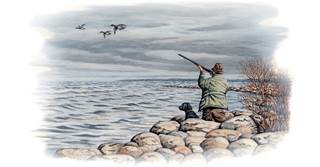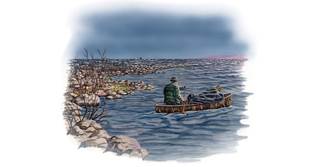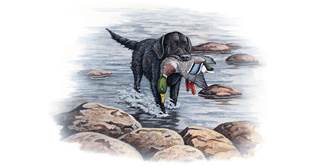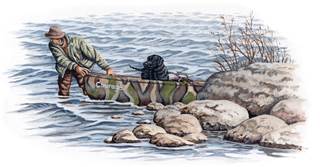A Lesson in Courage
In those days, I would load my canoe with hunting gear and head out to the island in any kind of weather... until the morning when it almost cost me everything
In those days, I would load my canoe with hunting gear and head out to the island in any kind of weather... until the morning when it almost cost me everything

Story and Illustrations by Chris Smith
There is an island I used to hunt. Through the blurry eyes of aging memory, I can still see its scrubby willows leaning sideways in a stout west wind, smell its pungent, algae-covered boulders, hear the unrelenting waves pounding its banks. A half-mile into Lake Michigan, obscured in the kind of gray gloom that often accompanied my early morning adventures, the island always enticed me to break free from the sandy shore and everything else that kept me safe and protected. I cherished that place. It's where I cut my teeth and formed my identity as a waterfowler.
When you're a budding hunter growing up in the sprawling suburbs of a larger city, it seems like it takes forever to escape the traffic lights to go duck hunting. I made it work by cutting class and faking sick notes, aided by my ex-schoolteacher father, who had done the same in his day and understood that his son was a lot like him.
But eventually the school-and my mother-grew wise to my schemes, and the time available to chase ducks grew perilously short. The only local area where a kid with a dozen decoys and a little knowledge could see ducks and maybe shoot one operated on a lottery system, and lucking into a productive spot there during a busy weekend was chancy at best. At that time, I wondered if the sport would ever grow into more than mediocrity and frustration for me. A seed, regardless of how deeply it's planted, still needs water.

By the grace of God, at the close of that season, Dad followed a new career path that took us away from the city. We relocated to a small town three hours north, in an area where ducks far outnumbered people. For any other kid, moving during senior year would have been tragic, but not for me. The creeks were full of fish and the sky was full of birds.
During that first spring, a reconnaissance trip revealed an island off the tip of a peninsula on Lake Michigan. The island, surrounded by a massive void of open water, was theoretically reachable by canoe, yet far enough from shore to be intimidating and almost menacing.
So on a warm day in May, I prepared for my first big-water scouting voyage. I was a brazen 18-year-old trying to hide my nervousness. Dad's encouragement helped squash my butterflies, even though I knew he was probably also a bit concerned. But it was a calm day, and I had no problem reaching the island. My first impression of the place was its smell. A combination of bird poop, algae, and rotting stuff hit me like an uppercut. It was a natural, defining aroma, and I loved it. But I didn't love the swarms of gnats and blackflies that infested the colony of nesting gulls.
I was flailing furiously at a cloud of blackflies when I first saw the ducks. A hen mallard with a brood of 10 little ones slinked out from a thick clump of willows, followed quickly by another family. Beyond them, two common mergansers swam with their crested heads underwater, searching for a meal. An eagle rolled by on a lazy breeze. Gulls moaned.
The aroma of island life lingered in my nostrils. It was perfect.

I imagined lines of bluebills strafing the boulders at the tip of the island while I hunkered in a homemade rock blind with Mags, my young black Lab, waiting for the ideal moment to rise and knock down a pair. Perhaps a freighter would be skirting the offshore beacon light, seeking shelter during an autumn gale. I pictured a fire in the willows to thaw my frozen digits. I hoped I would be tough enough to brave the elements and worthy of the birds I was hunting. It was a place no one else knew about. It was a place bursting with the promise of adventure.
That first fall, I managed to shoot a few puddlers that came to dabble among the island's many shallow pools and boulders. Mags loved it as much as I did, and when she wasn't fetching ducks, she explored the rocky ecosystem. There were remnant duck and gull nests to investigate and clam shells to drop at my feet. I built rock blinds for various winds and burned willow-branch fires. Dad came along occasionally but understood that a couple of pups, ripe for adventure, needed to forge their way alone. A sore ankle or too much work were his usual excuses, even though it probably killed him to stay home.
Late season brought the diving ducks I'd read about but never saw in the managed corn strips down state. Golden-eyes, scaup, bluebills, and broadbills buzzed in endless knots, regardless of the wind's strength, though usually out of range. Occasional redheads and canvasbacks would circle the half-mile-long island and inspect the decoys long enough for a few shots. There was also the odd chance for Canada geese as they sought refuge from field hunters on the mainland. Plenty of mergansers provided action for an eager young hunter and his itchy trigger finger. There was always something to do and a wild place to hang out, even if the ducks didn't show up.
I continued my passion while attending college in the Upper Peninsula, an equally wild place where persistence bagged more birds than any skill with a duck call or shotgun did. But I loved hunting with Mags, who, due to the rules of campus life, wasn't allowed in my townhouse. So I went home as often as possible during the season to hunt with her at the island.
Then, one day, things almost changed forever. It was November 10. I remember the date clearly because it is the anniversary of the sinking of the Edmund Fitzgerald, when 29 men had gone down with a freighter in Lake Superior.
Fittingly, it seemed like there were always good blows that time of year. That was certainly the case as I hightailed it home after Friday classes with a whipping northwest wind rattling my pickup truck at the crest of the Mackinac Bridge.
Given the forecast for continued high winds, Dad tried his hardest to convince me to postpone my planned trip to the island. But he relented after seeing the resolve in my eyes, and he bid me farewell the following morning after I promised to be careful and wear my life jacket. I was 20, a duck hunter, and invincible. No whitecapped swell was too big, no distance too great.
Pulling into the sandy parking area in the predawn darkness, I could hear the surf pounding the shore. In the years to come, I'd turn around under such circumstances. But as a young man, I felt there wasn't a body of water I couldn't ride out in the old fiberglass canoe that my brother and I had christened Jonathan Courage. The name was inspired by a beer we once saw in a restaurant, and the Courage never did us wrong in all her years of service.

A strong north wind meant a difficult journey in a boat as heavy as a Volkswagen even before being burdened with decoys, me, and the dog. For navigation in the dark, my only reference point was a blinking beacon a half mile past the tip of the island in water too deep to think about.
It was a long paddle in rough water, and about halfway to the island I realized that I had left my life jacket in the truck. But shooting light was imminent, and I decided to forge on without it. I was relieved to make out the hulking shape of boulders and willows on the island's south side, which offered a break from the pounding wind. The temperature had dropped to the low 30s with a dangerous wind chill. After deploying the decoys in the slack water on the lee sides, I lit a fire and felt life return to my cheeks. Sipping coffee in the shelter of a well-built blind while waiting for the magic minute was-and still is-the best part of any duck hunt.
With only a small knot of puddle-duck decoys downwind, the bulk of my spread consisted of bluebills and goldeneyes-the island's main November fare. The water beyond my spread resembled the ocean more than a lake. I imagined sitting on some scraggly shore off the coast of Maine chasing eiders, or on an Alaskan fjord in search of harlequins or Barrow's goldeneyes. The island was the ultimate place to dream. Duck hunting there had an edge to it.
At legal shooting light, dark shapes buzzed over the decoys, always a good sign even though I couldn't identify them. Then, 10 minutes later, a flock of big ducks ambled slowly in the wind. I could hear a hen mallard quacking, along with the guttural answers of a few drakes. I picked the closest bird and dropped him, a fat greenhead, and then promptly missed another, which would've been a rare double for me. Mags made quick work of my prized bird and quietly resumed her watch. We seldom talked when hunting together, appreciating those mornings for what I assumed were similar reasons.
A flock of gadwalls labored low in the wind, and my shot strings sprayed two feet behind them, at least. Remembering how Dad always said that wind blows steel shot, I doubled my lead and connected on my next opportunity, a hen bluebill strafing the decoys. She was one of only a few bluebills I'd ever taken. The drakes are beautiful, but the females are equally striking with their white cheek patches.
I stroked those feathers, admiring the bird so much that a flock of decoying mallards was already out of range by the time I noticed them. The island was in perfect form.
When the wind shifted to the southwest, I considered packing up. I'd be battling the wind all the way back now, and I wasn't sure if I'd have enough energy to make it. But the ducks were flying, so I decided to wait an extra 15 minutes.
Before long, there they were. Five beautiful goldeneyes. Trophy birds, especially if taken over decoys in this location. Open-water ducks that seldom ventured close to shore, for some magical-or cursed-reason these whistlers came right in like mallards, feet splayed to steady themselves in the wind.
I rose to my knees and dropped one bird perfectly dead.
It fell hard enough that I felt safe trying for another from the group as they flared hard in the gale. I fired again. With that sickening feeling every duck hunter knows, I watched that duck slant down with his head up. All ducks have the capacity to be tough cripples, but goldeneyes have had advanced training. He hit the water and dove like a submarine, coming up 30 yards away, and then was quickly down again.

Out in that big water, a wounded bird has all the advantage, especially when waves obscure the surface. I briefly considered counting it toward my limit and letting it go. But instead, I hauled out the Courage and pushed it into deeper water to chase that duck. Mags hopped in with me.
We picked up the first bird and caught sight of the other before he dove again. Through experience, I had learned that crippled divers swim and dive in more or less a straight line. I was gaining ground, but as I got farther from the protection of the island, the waves got larger and the wind blew harder. Taking my eyes off the bird for a peek behind, I realized that
I was in trouble.
The storm had carried me 300 yards from the island in a matter of minutes, and just like that, whitecaps were breaking over the stern. Seeing that water splashing into the boat was a shock, and I paused for a second, stunned, as the wind pushed us even farther from safety. Realizing what I needed to do, I was stunned again when the goldeneye surfaced within range. Praying Mags wouldn't leap overboard, I fired, dispatching it quickly.
Thanking God that we weren't wrong-side up and swimming, I paddled close enough to reach over the gunwale and nab the bird. And for a second time, I looked behind me.
Such a large icon of my life, the island now seemed small and forlorn. For a moment, I felt an irrational resentment toward my favorite place.
Assessing the situation, I decided that I had two choices, neither of which was inviting. I could ride it out or try to go back. Riding it out meant resting on the bleak hope of reaching the western point of the bay, five miles away, though we'd most likely capsize, given the size of the waves. And if I missed the shore, we'd end up in the Upper Peninsula, though surely dead from exposure.
The other option was to turn into the wind and paddle back to the island. Already spent, I made a feeble attempt to turn around in a large trough but started taking on water. The Courage was impossible to maneuver in that gale.
Still speeding away from the island, unable to come about or drift onward to whatever land mass lay ahead, I made a desperate choice.
Gripped with fear and exhaustion but gathering what little grit I could muster, I waited for another deep trough, so the canoe would be at its most level. When that trough came, I steadied myself and leaped forward, over Mags, over the center beam, and into the bow. For one perilous moment I had been completely airborne above the Courage and physically separated from my only chance for survival.
I landed awkwardly but safely. Now the bow of the canoe had become the stern and I was facing back toward the island. Too cold and tired to fully grasp what I had just done, I started paddling furiously. The water was black.
Fifty feet deep? A hundred? It didn't matter. I'd drown just as easily in 10. Paddling for my life didn't feel heroic. Instead, I felt foolish, like I'd made a terrible mistake that could cost me everything.
Slowly, I began making headway. It was like one of those superhuman moments you see in the Olympics. I was sweating profusely and drenched as we closed in on the island. Mags must have sensed the tension, because she kept low, peeking up occasionally to check our progress.
The rest of that paddle was a blur until the collision with a large boulder near the decoys snapped me back to the moment. With just enough energy to pull the canoe onto the island, I dropped to all fours, heaving. Mild hypothermia and dehydration are slow killers. I wanted desperately to take a rest in the shelter of my boulder blind, but Dad's words rang loud and clear in my ears. He always warned me about people who froze to death: "They curl up for a nap and never wake." So I decided to gather my gear and strike out for shore.
After painfully picking up icy decoys, I stumble-walked the canoe along the island, giving my arms a chance to recover somewhat before the windy, half-mile paddle back. Landing well down from the parking area, I hopped out in waist-deep water and hauled the Courage back through pounding waves. I was frozen and wet but alive.
After stowing sandy gear, boat, and dog, I blasted the truck's heater and thanked God for getting me back safely. As I sat in the truck, still breathing heavily and staring out over the huge bay and lonely island that now seemed so far away, the enormity of the morning started to sink in.
We would visit the island many more times, Mags and me and our little canoe. But we were always mindful of the forecast and kept a wary eye on the horizon. And on those days when the winds raced unimpeded across the big lake and the temperature plummeted, we hunted the mainland. Because wisdom, experience, and a little caution are more important than courage any day.
Ducks Unlimited uses cookies to enhance your browsing experience, optimize site functionality, analyze traffic, and deliver personalized advertising through third parties. By continuing to use this site, you agree to our use of cookies. View Privacy Policy